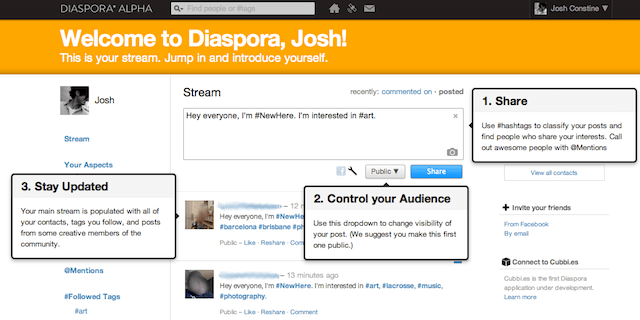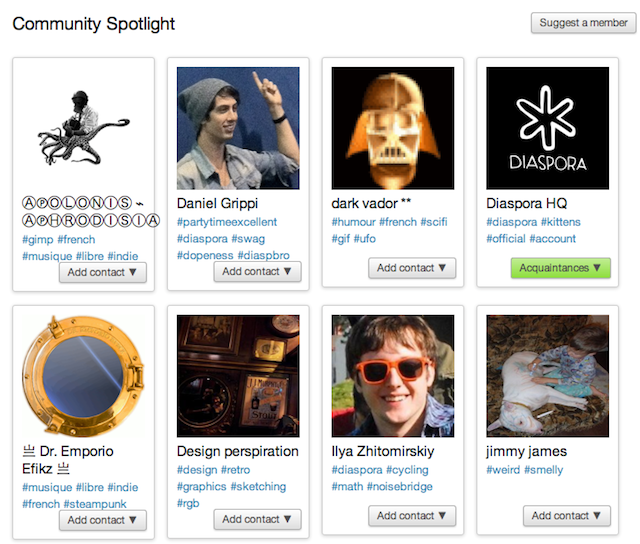Diaspora sent out a new round of invites to a redesigned alpha version of its open source social network today. The invites came just before the saddening news broke that 22 year old founder Ilya Zhitomirskiy had recently passed away. Since it first administered invites a year ago, the service has launched hashtag following, direct messages, status update Like buttons, a notifications channel, and more. Diaspora has also added support for its first application, Cubbi.es, which lets users instantly post photos they find on the internet to the service via browser extensions.
Though it has lost one of its forward thinking founders, the invites indicate that Diaspora will continue to pursue Zhitomirskiy’s goal to create a decentralized social network that “lets you be yourself and share however you want, with or without your real name.”
Because Diaspora is decentralized, those with invites join one of the distinct pods of fellow users set up on independently hosted servers rather than a single hub that connects everyone. Users can opt to build an identity from scratch, or choose to connect their Facebook account to import their real name, profile pic, and allow cross-posting from Diaspora.
Facebook’s presence in the onboarding process may surprise some who saw Diaspora as an attempt to depose Mark Zuckerberg’s highly centralized network. Instead, the optional Facebook integration shows the Diaspora team’s dedication to openness and a low-friction user experience.
Once you’ve chosen some hashtags to follow, you’re brought to your new home screen which displays a stream of content from friends and those hashtags. A familiar publisher allows updates to be shared publicly, or with specific friend circles Diaspora calls “aspects” built on an asymmetrical follow system. Published updates can also be syndicated to connected Facebook, Twitter, and Tumblr accounts.
In line with the site’s principles, its easy to download your photos or an .xml of your profile, as well as close your account. The site’s loading times are longer than on Facebook or Google+, but that’s to be expected of a startup social network. To really take off, Diaspora will need a better way for users to find and connect with Facebook friends and those they follow on Twitter. It does provide a suggested user list called “Community Spotlight”, though, which displays the profile pictures and followed hashtags of selected members to help new signups fill out their stream with relevant content.
To demonstrate the potential of its application platform, Diaspora is promoting Cubbi.es in its sidebar. Once users authenticate with their Diaspora account and download a Chrome or Firefox extension, they can simply hold shift and click on any photo they come across on the web to share it publicly.
Diaspora has now covered the bases to become a satisfactory solution for those uncomfortable with the compromises of control required for joining the leading social networks. Even if it doesn’t grow to hundreds of millions of users, Diaspora’s working alternative could influence the conversation about what a social network should be. This could inspire Facebook and Google+ to adopt some of Diaspora’s flexibility and expand the impact of Ilya’s ideals.
[Thanks to Dave Miller for the tip]

